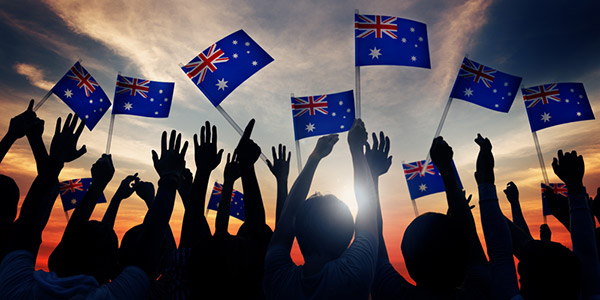What do you think makes us ‘Australian’? In an effort to discover the attitudes towards our national identity, a survey of 1200 Aussies conducted by Australian National University (ANU) in March asked a range of questions to that effect.
So, what does it mean to be ‘Australian’? According to the majority of respondents, being born here doesn’t necessarily matter, although nine in ten participants believe that the ability to speak English is important.
“Overwhelmingly, Australians believe that the ability to speak English is important to being Australian; while 92 per cent agree that language is important, 65 per cent see it as being ‘very important’, with only 27 per cent responding ‘fairly important’,” the report said.
The ANUpoll, Australian attitudes towards national identity: citizenship, immigration and tradition also found that those surveyed believe that immigration is one of the top three problems facing the nation and want the government to crack down further on illegal arrivals.
But despite nearly two-thirds expressing this sentiment, the general attitude towards immigration was positive, with 85 per cent believing that immigrants improve Australian society by bringing with them new ideas and cultures.
However, 30 per cent of the respondents feel that immigrants take jobs away from Australian-born citizens – an increase from the 25 per cent recorded in the 1995 referendum.
Other key findings of the survey include:
- Whilst the monarchy has increased in popularity, the restoration of the titles of knights and dames has been deemed an unpopular decision, with 58 per cent of Australians disapproving of the reintroduction of these honours.
- Around 90 per cent of Australians say they feel close to their country, and 80 per cent feel close to the town they live in.
- The level of national pride in 2015 is the lowest it has been in recent years, even though 92 per cent of Australians are either very or somewhat proud of their country.
- Around nine in ten Australians are very proud of their armed forces, 86 per cent are proud of our achievements in arts and literature and over 90 per cent are proud of our achievement in sports.
The economy remains the most important problem facing the nation, with better government and immigration following. It seems, however, that satisfaction with the direction of the country has declined over the past few years. In 2008, the net satisfaction levels were at 53 per cent compared with 19 per cent today.
It is hoped that the poll’s findings will contribute to a greater understanding of attitudes towards national identity, immigration and what it truly means to be Australian.
Read more about this on www.SBS.com.au
Opinion: We are one, we are many
Let’s face it – our country would not be as it is without the hard work and sweat of the millions of immigrants who have adopted this nation as their own. And whilst many of us would agree with this sentiment, we still have pressing immigration issues that need to be solved.
Whilst we are supportive of immigrants’ contributions to this great nation, no one, it seems, knows what to do with the thousands of refugees who also wish to call this country home. It’s a confusing issue, and there is no easy solution.
I agree that you don’t need to be born here to be Australian. I mean, you can rule the country without having been born here, as is the case with our two most recent Prime Ministers.
So, being Australian means that you accept and respect our nation’s laws and institutions, you land on our shores legally, and you have a good grasp of the English language. Assuming that the ‘illegal’ refugees sitting in detention centres both on and offshore can meet these requirements, does that mean we will let them in? Maybe we need to convert the detention centres into ‘national identity’ education centres, or something similar. Maybe that’s the answer to our refugee crisis.
I’m sure most of the displaced people looking to call Australia their own appreciate the sentiment that you don’t need to be born here to be Australian. But they’re still sitting in detention centres waiting for their chance to make this great country their home.
Many of the families detained in Nauru and Manus have risked their lives whilst crossing the ocean in leaky boats to make it to our shores. They may well become the most motivated citizens we could ever hope to adopt. Many of them have skills we could incorporate into our labour force and many of them would bend over backwards to be accepted into Australian society.
You need look no further back than post-Vietnam, when Malcom Fraser allowed Vietnamese refugees in to the country without appropriate documentation. No one can deny that the Vietnamese people have been amongst the hardest working citizens in the history of our country, not to mention the cultural and economic contributions they have made.
Let’s go back a little further to post WW2 – when approximately 2 million Italians, Greeks, Albanians and other Europeans were taken in as refugees. Most of them didn’t speak English, but they worked hard and sent their children to Australian schools to learn the language. It’s difficult to imagine the state of our nation without either of these influxes of refugees. Yet, as a nation, we seem to have a short-term memory when it comes to these examples of successful integration of immigrants and refugees.
What do you think it means to be Australian? How do you think we can best accomodate the refugees who want to call Australia home? What makes you proud to be Australian and what makes you ashamed?

